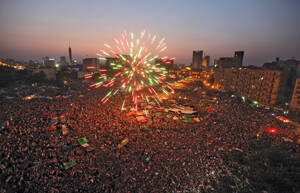Many Christians in Egypt looked on uneasily as Mohamed Morsi was declared the nation’s first democratically elected president on June 24. The election of Morsi, chairman of the Muslim Brotherhood’s Freedom and Justice Party, has fed fears that Islamists will use their political mandate to impose Islam-inspired restrictions on dress and behavior. But the new president, in negotiations with the nation’s ruling military council over what powers he will be allowed to wield, quickly pledged “to be a president for all Egyptians.”
“We have to accept Morsi, and now we will see what he will do,” said Michel Agram, a 45-year-old worshipper at the Melkite Catholic Church in Cairo’s Heliopolis district on June 25. “Not all Egypt wants Morsi. You can see that from the results,” Agram said. “I would hope [Morsi] knows this and will act accordingly.” Morsi won a narrow victory over Ahmed Shafiq, the last prime minister under the ousted President Hosni Mubarak. Shafiq had been viewed as the candidate most likely to protect the interests of Egyptian secularists and Christians. He left Egypt soon after Morsi’s victory was confirmed.
A statement to Morsi from the Coptic Catholic Church on June 25 praised his apparent “willingness...to work with skilled people of all groups and sectors of society to achieve the common good.” It continued: “We pray that the Lord gives you success...in developing the institutions necessary for the realization of a modern democratic civil state—a state that respects the rights and freedoms of everyone and guarantees security, peace and social justice.”
The declaration of Morsi as the winner of the run-off vote on June 16 and 17 followed a week of uncertainty, during which Egypt’s military ruling council introduced constitutional amendments that stripped the presidency of most of its powers and disbanded Parliament, giving the generals legislative authority and oversight in the drafting of the constitution.
As a candidate Morsi promised a “civil, democratic, constitutional and modern state.” He has said his administration will include women, secularists and members of Egypt’s Coptic minority in key positions, pledges met with skepticism by many Christians.
“It’s our tough luck to have Morsi for four years to come,” said Amgad Wahby, 35, standing outside the Catholic basilica in Cairo. “[The Muslim Brotherhood] have to change their priorities in order to survive. They need to try to be lenient at the beginning, but in the future they will probably try to return to their old, autocratic style,” he said.
The Rev. Rafic Grieche, spokesperson for the Egyptian Catholic bishops’ conference, noted that Egypt’s Christians had lived under Islamic regimes for 1,400 years. “We hope Morsi will be a just ruler,” said Father Grieche. “Mubarak’s time was not fair, and I do not think Morsi could be worse.”
“At the same time,” Father Grieche said, “the people of Islamic tendencies will be working to Islamicize the society. You don’t need laws to do this. It can happen in day-to-day life,” when for example, an employer might opt to hire a woman wearing a veil rather than one who does not.
“I’m disappointed, but I am not afraid,” Farah, 17, another worshiper at the Melkite Catholic Mass, said. “God is there to protect us; life will go on. If the worst happens and they try to make changes, then we will object. We will start another revolution. We won’t just give up.”








